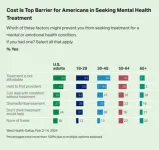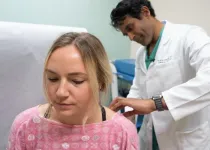(Press-News.org) A simple blood test could allow doctors to determine whether a person may be at higher risk for stroke or cognitive decline during their lifetime, according to a new UCLA Health study.
The study, published in the journal Stroke, found that measuring concentrations of a network of inflammatory molecules in the blood could allow doctors to calculate a risk score for susceptibility for cerebral small vessel disease – a common cause of stroke and a contributor to cognitive decline found especially among the elderly.
Currently, the only way to determine a person’s risk for cerebral vascular diseases has been to use a combination of imaging such as an MRI scan, family history, demographic variables and other risk factor evaluations, said study lead author Dr. Jason Hinman of the UCLA Comprehensive Stroke and Center and the Mary S. Easton Center for Alzheimer’s Research and Care at UCLA. In clinical practice, neurologists may only find a patient is at risk after they have had a stroke or a cerebral event that warns of one, Hinman said.
The new study found that by measuring the concentrations of this network of inflammatory molecules in the blood of patients who have not had a cerebrovascular event, medical providers may be able to quantitatively assess a person’s risk for cerebral small vessel disease and future stroke.
“The same way one uses cholesterol tests to evaluate one’s future risk for heart attack, we don’t have such a thing to estimate future risk for stroke,” Hinman said. “I believe we can do that by something as simple as a blood test which in theory can enable broader access to the best level of care and not lock it behind advanced imaging studies and specialist evaluations.”
The study focused on a biologically-connected network of inflammatory molecules known as the interleukin-18, or IL-18, network, which includes proteins and signaling molecules used to fight various infections.
Past studies have linked individual molecules in the IL-18 network to cerebral small vessel disease and stroke risk. However, the concentration of these individual molecules can fluctuate in response to other ailments such as the flu or autoimmune disorders, making them unreliable predictors of stroke risk at an individual level, Hinman said.
In 2020, University of California researchers including Hinman found that six molecules in the IL-18 network were associated with the presence of vascular brain injuries during MRI scans.
Building off these findings, Hinman sought to determine in this latest publication whether IL-18 network could be used to assess a person’s susceptibility to stroke risk or cognitive decline.
To test this, the researchers used health data from a generations-long study known as the Framingham Heart Study. This study has tracked the medical history of thousands of residents in the city of Framingham, Massachusetts, throughout their lives since launching in 1948. Blood samples taken from participants had been tested for five of the six molecules later identified as being in the IL-18 network.
By using the blood samples and medical histories of the Framingham participants, Hinman and his coauthor were able to create a mathematical model that generates a risk score based on the concentrations of the IL-18 network molecules. Of the more than 2,200 Framingham residents included in Hinman’s study, those whose risk scores were in the top 25% had an 84% chance of having a stroke during their lifetime. Overall, elevated risk scores were associated with a 51% increased risk of stroke and resulted in diagnostic prediction compared to existing risk assessment tools.
What remains unclear and requires further study is how or if a person’s risk score can be modified or reduced, Hinman said.
“The real challenge is in the primary care space. Are you at risk before you have an event?” Hinman said. “That’s what we’re all interested in doing is preventing a stroke before it even happens.”
Article: Association of Incident Stroke Risk with an IL-18-centered Inflammatory Network Biomarker Composite Published May 1, 2024, Martirosian et al., Stroke, https://doi.org/10.1161/STROKEAHA.123.044719
END
A blood test for stroke risk? Study finds network of inflammatory molecules may act as biomarker for risk of future cerebrovascular disease
UCLA Health researchers say findings could allow for first quantitative assessments for potential stroke, cognitive decline
2024-05-01
ELSE PRESS RELEASES FROM THIS DATE:
New survey finds 75% of Americans feel mental health takes back seat to physical health within U.S. healthcare system
2024-05-01
WASHINGTON, DC – May 1, 2024 – Three-quarters of Americans feel mental health conditions are identified and treated much worse than physical health issues within the U.S. healthcare system, even as more than 80% perceive a dramatic rise in prevalence of mental health issues in the last five years, according to a new survey from West Health and Gallup released at the start of Mental Health Awareness Month and Older Americans Month.
Nearly identical percentages believe mental health is handled either “much” (38%) or “somewhat” worse (37%) than physical health ailments, while 15% say they are dealt with “about the same.” ...
Brief anger may impair blood vessel function
2024-05-01
Research Highlights:
When adults became angry after remembering past experiences, the function of cells lining the blood vessels was negatively impaired, which may restrict blood flow. Previous research has found that this may increase the risk of heart disease and stroke.
In this study, episodes of anxiety and sadness did not trigger the same change in functioning of the blood vessel lining.
Embargoed until 4 a.m. CT/5 a.m. ET Wed., May 1, 2024
DALLAS, May 1, 2024 — A brief episode of anger triggered by remembering past experiences may negatively impact the blood vessels’ ability to relax, which is essential ...
Science advisors unite in a call for greater variety of evidence in developing policy
2024-05-01
What? 5th International Conference on Governmental Science Advice, INGSA2024, marking the 10th Anniversary of the creation of the International Network for Governmental Science Advice (INGSA) & first meeting held in the global south.
Where? Kigali Convention Center, Rwanda: https://www.ingsa2024.com/
When? 1 – 2 May, 2024.
Context: One of the largest independent gatherings of thought- and practice-leaders in governmental science advice, research funding, multi-lateral institutions, academia, science communication and diplomacy is ...
New Japanese lily species identified, 1st addition to sukashiyuri group in 110 years
2024-05-01
A new species of the Japanese lily known as sukashiyuri has been identified for the first time since 1914 by a research team led by Dr. Seita Watanabe, a specially appointed assistant professor at the Botanical Gardens and the Graduate School of Science at Osaka Metropolitan University.
Dr. Watanabe questioned the classification used up to now for sukashiyuri group, which usually has orange flowers. These lilies have high ornamental value, having been exported from Japan for more than two centuries. There have been only four taxonomic groups, but Dr. Watanabe and his team sought evidence to prove that there were ...
The popular kids in school may be sleeping less
2024-05-01
Due to a later melatonin onset and increased alertness in the evening, teenagers often find it hard to fall asleep at a time that would allow them to clock up the recommended eight to 10 hours of sleep each night.
It is also during teenage years when increasing school demands, activities, more independence from parents, and relationships with peers begin to compete with sleep. The role of social context, however, is often overlooked when studying adolescents’ sleep. Now, researchers in Sweden and Australia wanted to find out how popularity ...
Patients with rheumatoid arthritis have unique and complex autoantibody patterns
2024-05-01
Patients with rheumatoid arthritis (RA) all have a unique and diverse set of antibodies that are involved in the development of the disease. Researchers at Utrecht University unveiled the complexity of these antibodies using powerful lab tools capable of analysing our immune system at molecular levels. Their discovery suggests that current assumptions about the origin of RA are too simple. Still, their findings may point towards improved diagnostics.
Rheumatoid arthritis is a chronic autoimmune disease that primarily affects the joints, causing pain, stiffness, and swelling. It arises when the immune system mistakenly attacks the body’s own tissues, leading ...
Keck Hospital of USC earns an ‘A’ hospital safety grade from The Leapfrog Group
2024-05-01
LOS ANGELES — Keck Hospital of USC earned an “A” Hospital Safety Grade from The Leapfrog Group, an independent national watchdog organization.
“This grade puts Keck Hospital among the safest in the nation, and is a testament to the hospital’s commitment to the highest standards of quality and safety protocols,” said Marty Sargeant, MBA, CEO of Keck Medical Center of USC.
The Leapfrog Group assigns an “A,” “B,” “C,” “D” or “F” grade to general hospitals across the country based on over 30 measures of errors, accidents, injuries and infections and the ...
Survey finds young adults more likely to believe myths about sun protection and skin cancer prevention
2024-05-01
Orlando, Fla - A new national survey by the Orlando Health Cancer Institute finds nearly a third (32%) of Americans agree that a tan makes people look better and healthier, a dangerous beauty standard that experts say can lead to risky behavior when it comes to sun exposure.
“There is no such thing as a healthy tan, as it’s really just a visual manifestation of damage to the skin,” said Rajesh Nair, MD, an oncology surgeon at the Orlando Health Cancer Institute. “But we’re fighting against a perceived positive image and health benefits of something that actually has a totally opposite reality, which ...
Time zones and tiredness strongly influence NBA results, study of 25,000 matches shows
2024-05-01
The body clock has a significant impact on the performance of NBA players, according to study published in the peer-reviewed journal Chronobiology International.
The authors say their findings, from more than 25,000 matches, show elite basketball coaches and teams should consider the physical and mental effects of time zone travel when planning games and preparing for games.
A first of its kind, the research is based on the achievements at home and away of NBA (National Basketball Association) league players across 21 consecutive seasons. Considered the most competitive in the world, NBA athletes frequently travel ...
Premature menopause linked to increased musculoskeletal pain and likelihood of sarcopenia
2024-05-01
CLEVELAND, Ohio (May 1, 2024)—Musculoskeletal pain is a prevalent menopause symptom, which helps explain why women typically experience more pain than men, especially around the age of 50 years. Beyond pain, muscle function and mass are also affected by menopause. A new study suggests premature surgical menopause can lead to an increased risk of muscle disorders. Results of the survey are published online today in Menopause, the journal of The Menopause Society.
The highly publicized Study of Women’s Health Across the Nation spotlighted a number of symptoms that are common during the menopause ...
LAST 30 PRESS RELEASES:
Roadmap for Europe’s biodiversity monitoring system
Novel camel antimicrobial peptides show promise against drug-resistant bacteria
Scientists discover why we know when to stop scratching an itch
A hidden reason inner ear cells die – and what it means for preventing hearing loss
Researchers discover how tuberculosis bacteria use a “stealth” mechanism to evade the immune system
New microscopy technique lets scientists see cells in unprecedented detail and color
Sometimes less is more: Scientists rethink how to pack medicine into tiny delivery capsules
Scientists build low-cost microscope to study living cells in zero gravity
The Biophysical Journal names Denis V. Titov the 2025 Paper of the Year-Early Career Investigator awardee
Scientists show how your body senses cold—and why menthol feels cool
Scientists deliver new molecule for getting DNA into cells
Study reveals insights about brain regions linked to OCD, informing potential treatments
Does ocean saltiness influence El Niño?
2026 Young Investigators: ONR celebrates new talent tackling warfighter challenges
Genetics help explain who gets the ‘telltale tingle’ from music, art and literature
Many Americans misunderstand medical aid in dying laws
Researchers publish landmark infectious disease study in ‘Science’
New NSF award supports innovative role-playing game approach to strengthening research security in academia
Kumar named to ACMA Emerging Leaders Program for 2026
AI language models could transform aquatic environmental risk assessment
New isotope tools reveal hidden pathways reshaping the global nitrogen cycle
Study reveals how antibiotic structure controls removal from water using biochar
Why chronic pain lasts longer in women: Immune cells offer clues
Toxic exposure creates epigenetic disease risk over 20 generations
More time spent on social media linked to steroid use intentions among boys and men
New study suggests a “kick it while it’s down” approach to cancer treatment could improve cure rates
Milken Institute, Ann Theodore Foundation launch new grant to support clinical trial for potential sarcoidosis treatment
New strategies boost effectiveness of CAR-NK therapy against cancer
Study: Adolescent cannabis use linked to doubling risk of psychotic and bipolar disorders
Invisible harms: drug-related deaths spike after hurricanes and tropical storms
[Press-News.org] A blood test for stroke risk? Study finds network of inflammatory molecules may act as biomarker for risk of future cerebrovascular diseaseUCLA Health researchers say findings could allow for first quantitative assessments for potential stroke, cognitive decline






